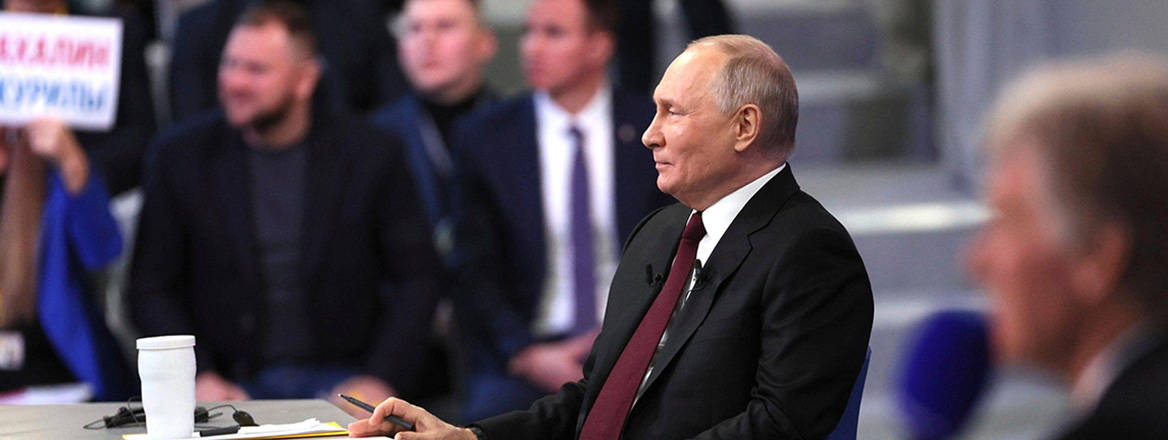As election season looms in Russia, the Central Election Commission's chosen opponents to the president will help to boost Putin’s narrative that he is the sole person capable of navigating Russia through this turbulent period.
In a country rocked by severe uncertainty over its future, the results of Russia’s upcoming elections are a lamentable certainty to all external observers of Russian politics. Since making constitutional changes in 2020, Putin has made it abundantly clear that he intends to cling to the reins of power in perpetuity. There is certainly no strong evidence to suggest that this election season should be any different.
The Importance of Elections in Russia
An authoritarian leader such as Putin requires displays of popularity to claim a mandate to rule. While the president remains firmly in control of Russia, elections are an essential tool in demonstrating his legitimacy among the Russian population.
According to government data, since his accession to the presidency in 2000, Putin has enjoyed an approval rating ranging between 60% and 90%. Regardless of the credibility of such data, the incumbent president has received very little challenge to his authority apart from fringe elements such as Alexei Navalny, founder of the Anti-Corruption Foundation. This is by no means a coincidence; Putin’s extreme centralisation of power, combined with Russian voters’ consistent apathy towards politics, allows for little galvanisation of anti-government movements.
Putin’s Challengers
As of 9 January, the Central Election Commission has confirmed three registered candidates to stand against Putin in March 2024: Leonid Slutsky of the Liberal Democratic Party of Russia, Nikolai Kharitonov of the Communist Party of the Russian Federation, and Vladislav Davankov of the New People party. These initial three candidates can be analysed to understand Putin’s election strategy and what we can expect from his campaign. Each candidate fields juxtaposing ideologies and domestic policies, but collectively they feed into Putin’s aim of tightening his grip on Russia during his next presidential term.
Further evidence can be seen in the group of potential candidates that have been rejected by the commission. Two examples stand out when it comes to understanding Putin’s campaign requirements, namely journalist Yekaterina Duntsova, whose main platform is based on ending the war in Ukraine, and former soldier and milblogger Igor Girkin, renowned for his ultra-national critique of the Russian leadership’s competency in Ukraine. Putin’s reputation has been increasingly at risk as Russia continues to remain involved militarily in Ukraine. He is likely to perceive the conflict as the biggest threat to his position, and consequently, anyone running on a platform of opposing the conflict or questioning his capability to lead during war has been quickly silenced. Putin has effectively removed the Ukraine question from the debate.
For Putin, it is critical that the continuation of conflict in Ukraine remains undisputed and is kept as far away from any election campaign platform as possible
Overall, it appears that Putin’s current opposition has been carefully selected for three distinct aims: to reinforce Putin’s narrative that he is the only acceptable candidate to do the job, to form a controlled opposition to exert his policy without resistance, and to weaken any genuine threats to his authority.
Image and Message
Putin’s decision to run as an independent candidate, despite complete support from his ‘United Russia’ party, sends a clear message to the electorate that while he operates within the confines of the political system, he stands above it, unburdened by ‘petty’ party politics. Choosing to run independently primarily demonstrates his confidence in his cult of personality, but symbolically separates him from the other contenders, some of whom have disreputable pasts that will certainly have remained within the public consciousness.
The leading example of this, Leonid Slutsky, holds a long history of controversy, ranging from political corruption to financial misdeeds and sexual harassment accusations. His ultra-nationalism has been known to border on barbaric, with reports suggesting that, while a member of the Russian team negotiating with Ukraine, he remarked that Azov fighters ‘don’t deserve to live’. Slutsky holds patriotic tendencies that would endear him to those who support Putin’s neo-imperialist aspirations, but his reputation will leave a bad taste in the mouths of those who are familiar with his past.
This candidate's poor reputation stands in stark contrast to Putin’s conservative Christian image. The softer themes underscoring his recent televised appearance on Russian Orthodox Christmas – vowing support for those defending Russia’s interests, asking his people to join in assisting the war effort, while remaining merciful – seamlessly feed into his desired image as a wise leader who is leading his country through great hardship. Slutsky’s equally patriotic but belligerent temperament will push the moderate vote into Putin’s camp.
Creating Controlled Opposition
The few similarities in policy between the candidates selected to run in opposition, in comparison to those who have been unsuccessful, point to the issue that Putin deems critical. Namely, that the continuation of conflict in Ukraine remains undisputed and is kept as far away from any election campaign platform as possible. To do this, Putin requires an opposition that acts the part but remains controllable and unremarkable to the public.
With this in mind, Nikolai Kharitonov, the Communist Party nominee, exists only as a faint blip on the Russian political radar. The septuagenarian is a youthful deviation from the expected candidate, General Secretary of the Communist Party Gennady Zyuganov. However, this is not Kharitonov’s first bid for the presidency. In 2004, he secured 13.8% of the vote, the worst outcome for any Communist Party candidate at the time.
While there is little impending threat to Putin’s reign from within the Russian political system, this has only been possible through careful manipulation of fringe voters
While Kharitonov has announced a 15-point manifesto centred around his slogan ‘We have played at Capitalism, now enough!’, there is an absence of clear policy direction beyond the expected ideological tenets of communism. The communist candidate has even stated that he wishes to run a consolidated campaign without great expense of labour, so as not to detract from the Special Military Operation or other Russian political affairs. This is an explicit indicator of the current state of the ‘opposition’ within the Duma. Kharitonov is a safe candidate: he possesses experience of the presidential race, yet is inoffensively unimportant enough to avoid upsetting the authorities. His accession to candidate status is in large part a result of Putin’s efforts to control the opposition and provide himself with an unobstructed platform to campaign from.
Weakening Genuine Threats
In comparison to their Western counterparts, the Russian populace have become increasingly apathetic to the issue of politics. However, while there is little impending threat to Putin’s reign from within the Russian political system, this has only been possible through careful manipulation of fringe voters. Vladislav Davankov, leader of the party New People, exemplifies the manipulation and spoiling of the Russian liberal vote.
While Davankov’s election manifesto remains to be seen, the circumstances surrounding the legitimacy of his party remain questionable. Davankov’s father Alexander is the business partner of ‘New People’ founder Alexei Nechayev at Faberlic, a global makeup company. Curiously, several of its employees, including Davankov, represent the party. Furthermore, Nechayev is a member of the All-Russian People’s Front, an organisation led by Putin himself.
These various connections running back to government authority figures cast doubt over whether New People holds genuine interest in developing beyond Putin, or if it is a distraction against those who legitimately seek to enact political change within Russia. Ultimately, one must ask if any legitimate threat to Russian autocracy could have made it so far in the presidential race. New People’s liberal-leaning ideology masks its true purpose as a token party aimed at splitting the vote among the remaining active anti-government population. With this party’s inclusion, Putin further legitimises his election without any of the risk associated with including genuine reform-focused candidates.
What to Expect?
The outcome of the election is by all accounts a given. Instead, the focus of analysis over the next few months should be on how Putin’s election campaign is conducted, as this will indicate his intentions while in office for the next term. Over the next few weeks, we should expect Putin to continue projecting the message that he stands alone, peerless and unassailable in the role of steering the Russian political machine. The suspiciously poor selection of opposing candidates, combined with their lacklustre commitment to campaigning, only further adds to the grim portents for Russia’s short-term political future.
The views expressed in this Commentary are the author’s, and do not represent those of RUSI or any other institution.
Have an idea for a Commentary you’d like to write for us? Send a short pitch to commentaries@rusi.org and we’ll get back to you if it fits into our research interests. Full guidelines for contributors can be found here.
WRITTEN BY
Callum Fraser
Research Analyst, International Security
International Security
- Jim McLeanMedia Relations Manager+44 (0)7917 373 069JimMc@rusi.org


